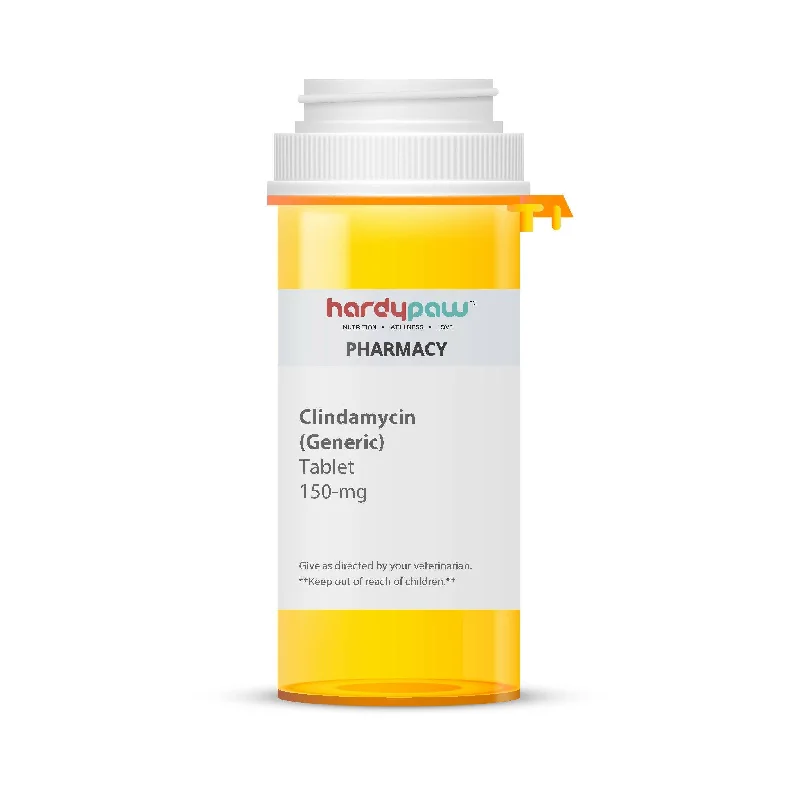Comprehensive Antibiotic for Bacterial Infections
Clindamycin is a potent antibiotic for dogs, specifically formulated to combat and prevent various bacterial infections. This versatile antibiotic is widely used in veterinary medicine to treat infections in skin, dental, bone, and respiratory tract tissues. Its effectiveness lies in targeting gram-positive bacteria, which have a weaker cell wall structure.
Clindamycin works by disrupting protein synthesis within bacterial cells, preventing their growth and helping your dog recover from infections like abscesses, osteomyelitis, and periodontal disease.
Prescription items are NON-RETURNABLE and NON-REFUNDABLE.
NOTE: Generic medications may vary from one order to the next by size, color and shape depending on manufacturer. Please note product may arrive in a Hardy Paw Pharmacy vial.
What are the Benefits of Clindamycin for Dogs?
- Effective Against Multiple Infections: Clindamycin is especially potent in treating infections in soft tissues, oral cavities, bone, and airways.
- Specialized for Gram-Positive Bacteria: Its mechanism targets gram-positive bacteria such as Staphylococcus and Streptococcus, making it ideal for infections caused by these strains.
- Supports Wound Healing: Frequently prescribed to manage post-surgical infections and abscesses, clindamycin helps reduce the risk of further complications.
- Treats Bone Infections (Osteomyelitis): Clindamycin is highly effective in managing deep-seated infections like osteomyelitis, a severe bone infection that can spread if left untreated.
How to Use Clindamycin for Dogs?
Always consult your veterinarian for exact dosage instructions based on your dog’s specific condition.
The general dosage varies depending on the severity and type of infection being treated. Clindamycin is typically given orally in capsule or liquid form and may be taken with or without food.
What Ingredients Are in Clindamycin?
The active ingredient in this medication is , a derivative of lincomycin. This compound works by preventing bacteria from synthesizing essential proteins, effectively stopping their growth and spread.
What Are the Possible Side Effects of Clindamycin?
Like all medications, Clindamycin can cause side effects in some dogs, though most tolerate it well. Common side effects include:
- Gastrointestinal upset: Vomiting, diarrhea, or loss of appetite may occur. These symptoms often subside as your pet adjusts to the medication.
- Rare reactions: In some cases, severe allergic reactions like swelling, rash, or difficulty breathing could occur. If these symptoms are noticed, consult your vet immediately.
Are There Any Warnings or Precautions When Using Clindamycin?
- Avoid use in animals allergic to lincomycin or clindamycin.
- Dogs with kidney disease or liver problems should be closely monitored by a vet when taking Clindamycin.
- Prolonged use may result in secondary infections, such as fungal infections, due to the elimination of beneficial bacteria. Always follow the prescribed treatment plan to avoid complications.
How Should I Store Clindamycin?
Store Clindamycin at controlled room temperatures, ideally between 68°F and 77°F. Ensure that the medication is kept in a dry place, out of reach of pets and children.
Shipping & Returns
Shipping Policy: We offer all types of shipping options (Ground, Express, Priority, International) depending on the urgency of the product requirements. To know about our shipping policy in detail,
Refund policy: If you face any issue with our product and want to return it, read our carefully.
FAQs - Clindamycin Tablets for Dogs
What is Clindamycin used for in dogs?
Clindamycin is an antibiotic prescribed to treat bacterial infections in dogs. It is effective against skin infections, bone infections like osteomyelitis, respiratory infections, and dental diseases. It works by stopping bacterial growth, specifically targeting gram-positive bacteria like Staphylococcus and Streptococcus.
How does Clindamycin work in dogs?
Clindamycin works by inhibiting the protein synthesis of bacteria, which prevents them from growing and multiplying. This makes it particularly effective against gram-positive bacteria that cause infections in the skin, bones, and mouth.
Can Clindamycin treat abscesses in dogs?
Yes, Clindamycin is commonly used to treat abscesses in dogs. Its ability to target anaerobic bacteria and its penetration into soft tissues make it a go-to antibiotic for managing skin infections and abscesses caused by bacteria.
Is Clindamycin safe for long-term use in dogs?
Long-term use of Clindamycin should be monitored by a vet, as prolonged antibiotic use can lead to secondary infections, such as yeast or fungal infections. Your veterinarian may adjust the treatment plan based on the response to therapy and overall health of your dog.
Can Clindamycin be used alongside other medications?
Clindamycin can interact with other medications, including certain antibiotics like erythromycin. It’s crucial to inform your vet about any other medications your dog is taking to avoid potential drug interactions that could reduce efficacy or cause side effects.
Does Clindamycin require a prescription?
Yes, Clindamycin is a prescription-only medication. A veterinarian must evaluate your dog’s condition and determine if this antibiotic is appropriate for the type of infection being treated.
Can Clindamycin cause allergic reactions in dogs?
Allergic reactions to Clindamycin are rare but possible. Signs may include swelling, difficulty breathing, or a rash. If your dog exhibits any signs of an allergic reaction, discontinue use immediately and consult your veterinarian.
How should I manage missed doses of Clindamycin?
If you miss a dose of Clindamycin, give it as soon as you remember. If it’s almost time for the next dose, skip the missed dose and resume the regular schedule. Never double up on doses to compensate for a missed one, as this could increase the risk of side effects.
Can Clindamycin cause resistance in bacteria?
Yes, bacteria can develop resistance to antibiotics like Clindamycin if not used properly. It’s important to complete the full course of treatment even if your dog seems to be feeling better to avoid bacterial resistance and ensure the infection is fully cleared.
How long does Clindamycin stay in a dog’s system?
Clindamycin is metabolized and excreted relatively quickly, but the exact duration it stays in your dog’s system depends on factors like dosage, frequency, and your dog’s kidney and liver function. Typically, it is eliminated from the system within 24-48 hours after the last dose.

